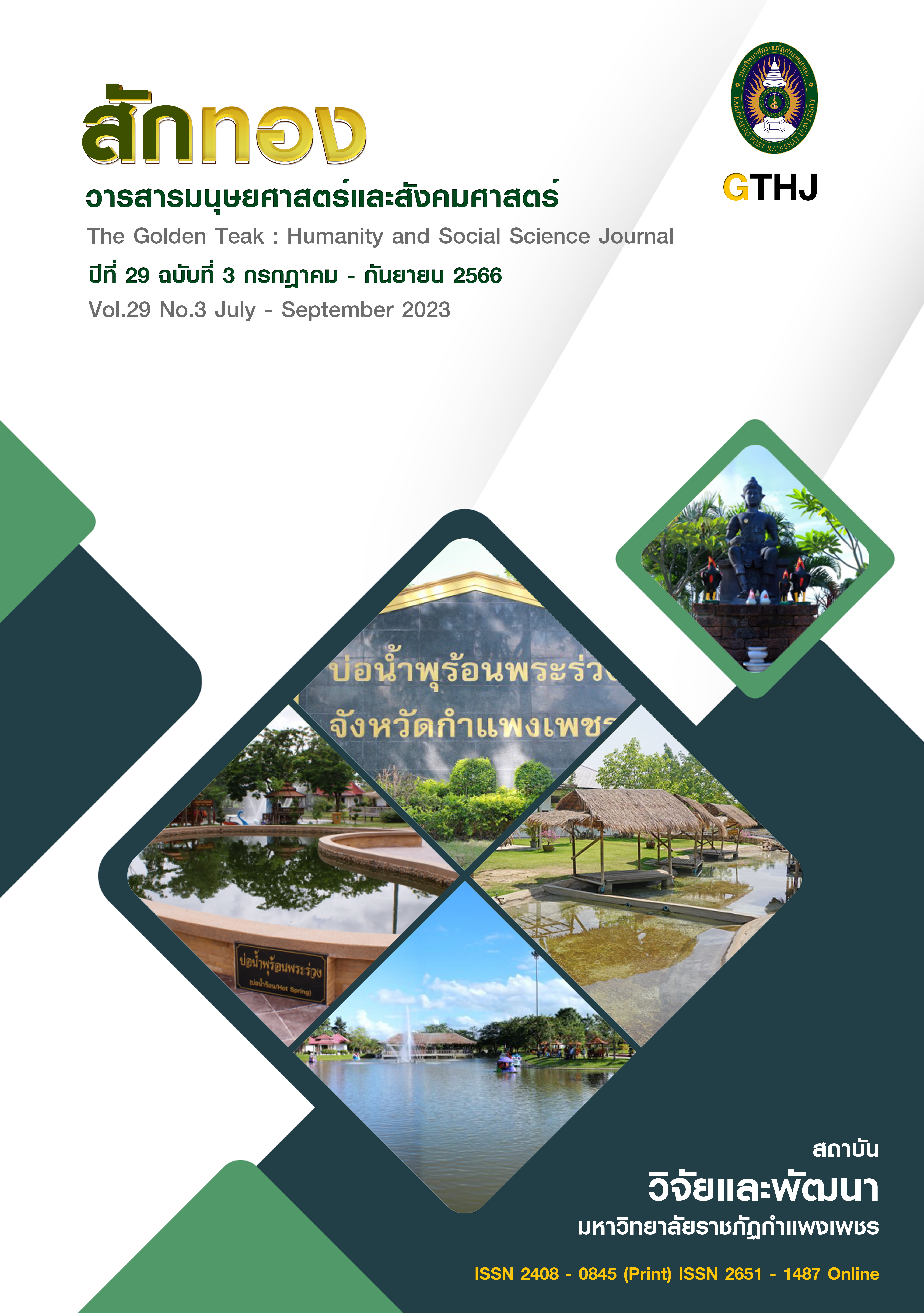การพัฒนาหลักสูตรเสริมเพื่อเสริมสร้างความฉลาดทางดิจิทัลของนักศึกษา มหาวิทยาลัยสะหวันนะเขต สาธารณรัฐประชาธิปไตยประชาชนลาว
Main Article Content
บทคัดย่อ
การวิจัยครั้งนี้ มีจุดมุ่งหมายหลักเพื่อพัฒนาและศึกษาผลการทดลองใช้หลักสูตรเสริมเพื่อเสริมสร้างความฉลาดทางดิจิทัลของนักศึกษา มหาวิทยาลัยสะหวันนะเขต สาธารณรัฐประชาธิปไตยประชาชนลาว การดำเนินการวิจัยแบ่งเป็น 4 ระยะ คือ 1) ศึกษาองค์ประกอบและตัวบ่งชี้ของความฉลาดทางดิจิทัลของนักศึกษา 2) ศึกษาความต้องการจำเป็นในการเสริมสร้างความฉลาดทางดิจิทัลของนักศึกษา 3) พัฒนาหลักสูตร และ 4) ศึกษาผลการทดลองใช้หลักสูตร กลุ่มตัวอย่างในการทดลองใช้หลักสูตรเป็นนักศึกษาระดับปริญญาตรี มหาวิทยาลัยสะหวันนะเขต ปีการศึกษา 2564 จำนวน 20 คน เครื่องมือวิจัย อาทิ แบบประเมินความเหมาะสมขององค์ประกอบและตัวบ่งชี้ แบบสอบถามสภาพคาดหวังและสภาพที่มีอยู่จริงเกี่ยวกับความฉลาดทางดิจิทัล หลักสูตร แผนการจัดการเรียนรู้ แบบวัดความฉลาดทางดิจิทัล และแบบสอบถามความพึงพอใจ สถิติที่ใช้วิเคราะห์ข้อมูล ได้แก่ ร้อยละ ค่าเฉลี่ย ส่วนเบี่ยงเบนมาตรฐาน การวิเคราะห์องค์ประกอบเชิงยืนยัน ดัชนีความต้องการจำเป็นแบบปรับปรุง (PNImodifies) และการทดสอบค่าทีแบบกลุ่มไม่อิสระกัน ผลการวิจัย มีดังนี้ 1. ความฉลาดทางดิจิทัลประกอบมี 8 และ 39 ตัวบ่งชี้ 2. ความต้องการจำเป็น ในการพัฒนาความฉลาดทางดิจิทัลของนักศึกษา มีค่าดัชนีความต้องการจำเป็น (PNImodifies) ในภาพรวมเท่ากับ 0.74 3. หลักสูตรที่พัฒนาขึ้น มี 7 องค์ประกอบ คือ 1) ที่มาและความสำคัญ 2) จุดมุ่งหมาย 3) หลักการ 4) กรอบความฉลาดทางดิจิทัล 5) โครงสร้างเนื้อหา 6) กระบวนการจัดการเรียนรู้ และ 7) การวัดและประเมินผล โดยที่ กรอบความฉลาดทางดิจิทัลมี 8 องค์ประกอบ 39 ตัวบ่งชี้ ขั้นตอนการจัดการเรียนรู้มี 6 ขั้น คือ 1) กระตุ้นการเรียนรู้สู่การกำหนดปัญหา 2) วางแผนการค้นคว้าและการนำใช้ 3) มุ่งมั่นเรียนรู้สู่การปฏิบัติ 4) ระดมความคิด 5) นำเสนอผลงาน และ 6) ประเมินผลการเรียนรู้ ซึ่งผลการประเมินหลักสูตรโดยผู้เชี่ยวชาญ พบว่า มีความเหมาะสมอยู่ในระดับมากที่สุด 4. ผลการทดลองใช้หลักสูตร พบว่า นักศึกษามีความฉลาดทางดิจิทัลหลังเรียนสูงกว่าก่อนเรียนอย่างมีนัยสำคัญทางสถิติที่ระดับ 01 และมีความพึงพอใจต่อการเรียนอยู่ในระดับมากที่สุด
Article Details

อนุญาตภายใต้เงื่อนไข Creative Commons Attribution-NonCommercial-NoDerivatives 4.0 International License.
บทความที่ได้รับการตีพิมพ์เป็นลิขสิทธิ์ของวารสาร สักทอง : วารสารมนุษยศาสตร์และสังคมศาสตร์ สถาบันวิจัยและพัฒนา มหาวิทยาลับราชภัฏกำแพงเพชร
ข้อคิดเห็นใดๆ ที่ปรากฎในวารสารเป็นวรรณกรรมของผู้เขียนโดยเฉพาะ ซึ่งมหาวิทยาลัยราชภัฏกำแพงเพชรและบรรณาธิการไม่จำเป็นต้องเห็นด้วย
เอกสารอ้างอิง
Benjamin, B. (1973). Dictionary of Behavioral Science. Van Nostrand : Reingeld Company.
Boonrawd, A. (2017). Appropriate use of media in the digital age. [Online]. Available : https://www.bangkokbiznews.com/blog/detail/642899 [2019, July 18]. [In Thai]
Chotiboon, S. (2016). Development of an enrichment Curriculum to enhance Health Literacy for Primary Students Based on The Concepts of Participatory Learning and Self-Regulated Learning. Doctor of Philosophy Degree’s thesis in Research of Curriculum and Instruction, Sakon Nakhon Rajabhat University. [In Thai]
Davis, G. & Rimm, S. (1994). Education of the Gifted and Talented. (3 rd ed.). Massachusetts : Allyn and Bacon.
Inthanon, S. (2018). Digital Intelligence. Natchawat : the Foundation for the Promotion of Media for Children and Youth.
Inthanon, S. (2018). Cybersecurity. Natchawat : the Foundation for the Promotion of Media for Children and Youth.
Inthanon, S. (2018). Cyberbullying. Natchawat : the Foundation for the Promotion of Media for Children and Youth.
Konglark, L., Sathiantip, A. & Inthanon, S. (2018). Preparation of Fact Sheet, Digital Intelligence and the study of cyberbullying of teenagers. Research, Children and Youth Media Institute.
McCormick, Ernest J. & Daniel, Ilgen R. (1980). Industrial Psychology. Englewood Cliffs, New Jersey : Prentice-Hall.
Ministry of Education and Sports. (2008). National Education Reform Strategic Plan. Ministry of Education and Sports Vientiane Capital : Ministry of Education and Sports.
Ministry of Education and Sports. (2015). National Education Law revised edition. Ministry of Education and Sports Vientiane Capital : Ministry of Education and Sports.
Ministry of Post and Telecommunications. (2018). Towards Digital Transformation. Lao ICT EXPO 2018. Vientiane Capital : Ministry of Post and Telecommunications.
Ministry of Post and Telecommunications. (2015). Computer Crime Suppression and Prevention Act. Ministry of Education and Sports Vientiane Capital : Ministry of Education and Sports.
Panakul, S. (1999). Curriculum and Methods of Teaching. Faculty of education. Ramkhamhaeng University : Ramkhamhaeng University. [In Thai]
Punatung, R. (2017). Development of an Enrichment Curriculum for Enhancing Information Literacy According to The Blended Learning And Brain-Based Learning Concepts for Upper secondary School Students. Doctor of Philosophy Degree’s thesis in Research of Curriculum and Instruction, Sakon Nakhon Rajabhat University. [In Thai]
Phongnatee, S. (2017). Cyber Security and Dealing with Cyber Intimidation. Addressed at a meeting APNIC (Asia Pacific Network Information Center). Ministry of Posts and Telecommunications. [Online]. Available : https://www.laocert.gov.la/Photogallery-Album-53 [2020, June 20].
Rachsingho, J. (2013). Development of a Standard Enrichments Curriculum for Enhance information Literacy of Prathom Suksa 5-6 Students. Doctor of Philosophy Degree’s thesis in Research of Curriculum and Instruction, Sakon Nakhon Rajabhat University. [In Thai]
Simpson, R. & Obdalova, O. (2014). New Technologies in Higher Education-ICT Skills of Digital Literacy? Procedia-Social and Behavioral Sciences [Online Serial] 154, Available : https://www.sciencedirect.com/science/article/ pii/S1877042814055700 [2019, May 18].
Siayavong, M. (2016). Communication skills for students. Vientiane Capital : the Department of Higher Education. Ministry of Education and Sports.
Thammaphiban, W. (2012). A Development of enrichment Curriculum to enhance desirable public mind for undergraduate students at THAKSIN University, SONGKHA CAMPUS. Doctor of Education Degree’s thesis in Curriculum Research and Development, Srinakharinwirot University. [In Thai]
Techataweewan, W. & Prasertsin, A. (2016). Digital Literacy Assessment of the Undergraduate Students to the Universities in Bangkok and Its Vicinity. Journal of Information Science, 34(4), 5.
UNESCO. (2004). The Plurality of literacy and its implications for policies and programs. Paris : UNESCO.
Wannapiroon, P. (2017). Digital Intelligence. Develop education techniques, 29(102), 12-20.
Wongkitrungruang, W. (2018). Digital Citizen's Guide. Bangkok : Digital Economy Promotion
Agency Ministry of Digital Economy and Society. [In Thai]


